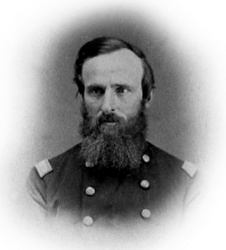Cross Lanes, September 19, 1861.
Dearest: It is a lovely moonlight evening. I mailed you a letter this morning, but as Lieutenant Wall of Captain McIlrath’s company has resigned to go with the navy, and will go to Cincinnati tomorrow, I thought I would say a word further while our band plays its finest tattoo tunes. They are sweet, very. I have tried four or five cases on general orders, and here comes an order making me permanently a J. A. [judge-advocate]. It is not altogether agreeable. I shall get out of it after a while somehow. For the present I obey. It is pleasant in one respect as showing that in my line I have done well. Lieutenant Wall will, I hope, call and see you. He is a good soldier and we are sorry to lose him. If this reaches you before other letters from here and Birch River, you may know that two older and longer ones are after you.
One thing in the new appointment: If I can’t get out of it, you may see me one of these days, sooner than you otherwise would, as it confers some privileges, and that would be sweet. Love to all.
Affectionately,
R. B. Hayes.
P. S. – We hear tonight of the death of Colonel Lorin Andrews at Kenyon.[1] We feel it more deeply than in most cases. He was my classmate – a fellow student of Colonel Matthews. He took a great interest in our efforts to get a place in the war, and rejoiced with us when we got a fine regiment. McCook gave me Andrews’ spurs when he left for home, to wear until his return. Alas! we are not to see him. He was an earnest, true man. Hail and farewell! We have been so full of humor tonight and this saddens us. Good-bye again, dearest.
Mrs. Hayes. R.
[1] Lorin Andrews born at Ashland, Ohio, April 1, 1819. Studied law, but soon gave up the practice to devote himself to work of education. He was President of Kenyon College at the outbreak of the war and was the first man in Ohio to offer his services to the country. He was colonel of the Fourth O. V. I. in the first campaign of the war and “died, a martyr to the Union, September 18, 1861.”
